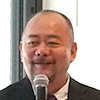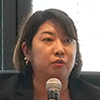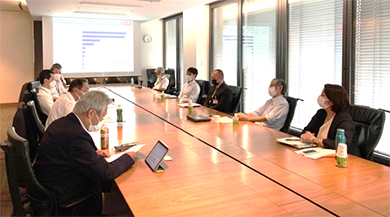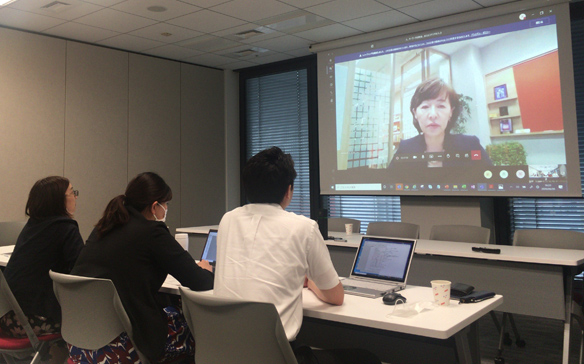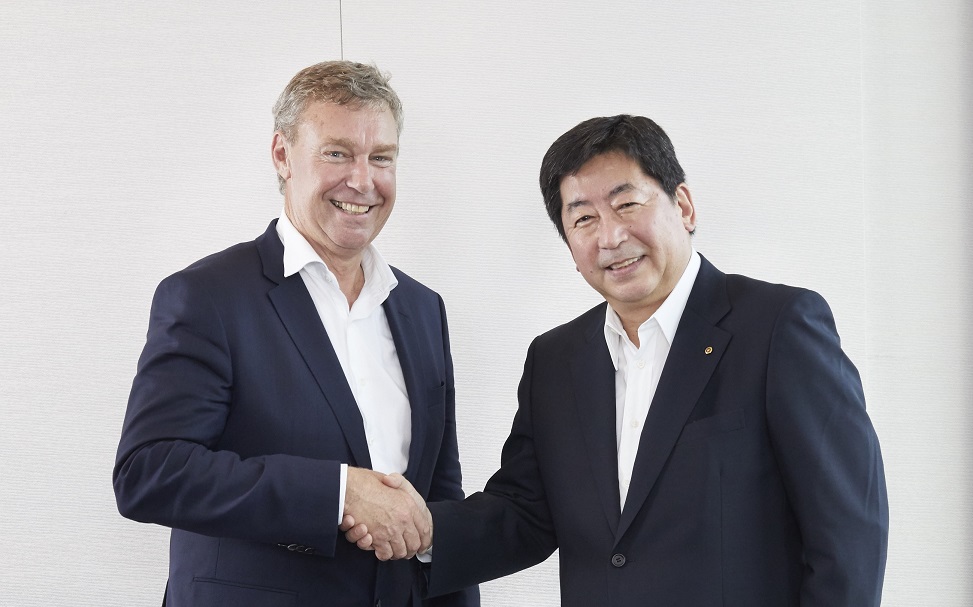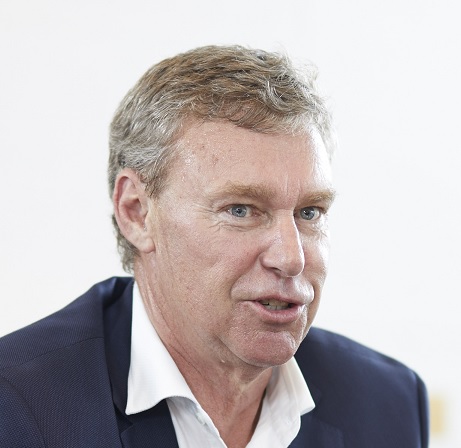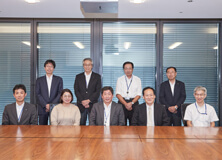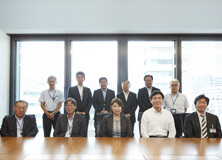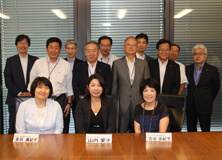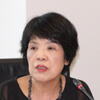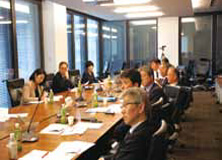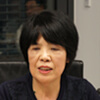Try to solve issues together with our stakeholders
This is the essence of the Nissui Group's activities for sustainability.

The Nissui Group, aiming to solve key issues, has been engaged in numerous external communications with stakeholders and promoting activities while reminding ourselves to not become complacent.
Stakeholder Dialogue
The 6th Stakeholder Dialogue (FY2024)
Date
September 9, 2024
Theme
Results of 3rd Survey of Marine Resources Handled by the Nissui Group and Future Initiatives
Experts
Satoshi Maekawa
WWF Japan,
Oceans and Fisheries Group Leader
Hiroyuki Matsuda
Yokohama National University,
Institute for Multidisciplinary Sciences
Distinguished YNU Professor
Aiko Yamauchi
Seafood Legacy Co., Ltd.,
COO/Vice President
Opinions from the experts
- Recognition of the Nissui Group's initiatives has grown through the Survey on the Status of Marine Resources and proactive information disclosure.
- We commend the autonomous initiatives being undertaken in Southeast Asia, such as genetic identification of fish used as surimi raw materials and socio-scientific evaluation of extensive shrimp farming.
- Marine products face numerous human rights challenges, and we hope to see further initiatives that address these concerns.
- For resources with unknown status and raw materials that are difficult to trace, it is essential to collaborate with stakeholders, including external organizations and business partners, to develop viable solutions.
The 5th Stakeholder Dialogue (FY2021)
Date
September 13, 2021
Theme
Results of 2nd Survey of Marine Resources Handled by the Nissui Group and Future Initiatives
Experts
Kozo Ishii
MSC Japan, Program director
Satoshi Maekawa
WWF Japan, Oceans and Fisheries Group Leader
Hiroyuki Matsuda
Yokohama National University, Professor
Aiko Yamauchi
Seafood Legacy Co., Ltd., Senior Officer
Opinions from the experts
- The survey method has improved since the previous one was conducted.
- While many companies conduct their own research and analysis, the fact that the company chose to use a method that can guarantee the integrity of a third party is good; moreover, it is also important to ensure transparency in information disclosure, etc.
- Procurement of endangered species requires careful attention to individual population levels based on the assessment information provided by the IUCN for each particular species.
- Although it is necessary to expand the number of certified products, the goal should not be their procurement, but rather to clearly define Nissui's vision of sustainability and aim to achieve that vision.
Online Dialogue (FY2020)
Date
June 20, 2020
Theme
Diversity and Employee Health: Keystones of Business Management Strategies
Experts
Kaori Sasaki
CEO of ewoman, Inc.
CEO of UNICUL International, Inc.
Chair of International Conference for Women in Business
Opinions from the expert
Please see the following link for the details.
Sustainability Report 2020(14.9MB)
Featured Dialogue (FY2019)
Date
June 30, 2019
Theme
The Merits of a Global Partnership
Experts
Martin Exel
Seafood Business for Ocean Stewardship (SeaBOS)
Managing Director
Opinions from the expert
Please see the following link for the details
Sustainability Report 2019 “Featured Dialogue”(954KB)
The 4th Stakeholder Dialogue (FY2018)
Date
August 1, 2018
Theme
Concerning the survey results of the marine resources handled by the Nissui Group, as well as sustainable procurement and combating IUU fishing
Experts
Aiko Yamauchi
Leader
Oceans and Seafood Group
Conservation Division
WWF Japan
Yoshioki Oozeki, Ph.D.
Senior Adviser
Japan Fisheries Research and Education Agency
Opinions from the experts
-
Concerning the Survey Results of Marine Resources Handled by the Nissui Group
- You’ve put together some fantastic data…going to all that trouble is rare, even globally.
- Close to 40% of the marine resources Nissui procured were marine eco-labeled certified. This is also meaningful for the operator as a way of validating one’s own activities.
-
Concerning Sustainable Procurement and Combating IUU Fishing
- Creating a sustainable procurement mechanism that includes suppliers will also be effective in combating IUU fishing.
- Maintaining communications with suppliers will be a way for the company to avoid risk.
The 3rd Stakeholder Dialogue (FY2017)
Date
September 5, 2017
Theme
Sustainability of marine resources and sustainable procurement
Experts
Aiko Yamauchi
Leader
Oceans and Seafood Group
Conservation Division
WWF Japan
Keiichi Ushijima
Japan CCaSS Leader, Principal
Climate Change and Sustainability Services (CCaSS)
Ernst & Young ShinNihon LLC (EY Japan)
Opinions from the experts
- How to evaluate the impact of issues on future operations and share it with employees in the process of determining key issues.
- The question is what kind of leadership Japanese companies can show in the area of global marine resource management.
- There are cases of forced labor and child labor being involved in the procurement supply chain without the company’s knowledge. Human rights violations will be a future management risk.
- Capacity building of supporting the improvement of a supplier’s capabilities helps cultivate a lasting relationship.
The 2nd Stakeholder Dialogue (FY2016)
Date
September 6, 2016
Theme
Key Issues of the Nissui Group
Experts
Makiko Akabane
Director, Japan
CSR Asia
Advisor
Japan NGO Center for International Cooperation (JANIC)
Yukiko Furuya
President
Consumer Conference for Sustainability (CCFS)
Standing Advisor
Nippon Association of Consumer Specialists
Aiko Yamauchi
Leader
Oceans and Seafood Group
Conservation Division
The World Wide Fund for Nature, Japan (WWF Japan)
Opinions from the experts
- A global marine products company requires the perspectives of (1) conservation of the ecosystem, (2) the lives of fishermen and factory workers, (3) humane work styles (e.g. labor conditions) and (4) governance.
- In terms of food education and food loss, it is crucial to maintain a stance of the company solving issues together with the consumer, e.g. by making proposals that take into account the impact of consumer behavior.
- A global perspective is essential when dealing with hunger and food pillaging because of its security aspects.
- Measures are required such as articulating the relationship with SDGs.
The 1st Stakeholder Dialogue (FY2015)
Date
February 12, 2016
Theme
“Nissui Group’s business management and CSR”
The type of CSR that the Nissui Group needs to reinforce
Experts
Eiichiro Adachi
Counselor
Head of ESG Research Center
The Japan Research Institute, Limited
Aiko Yamauchi
Leader
Oceans and Seafood Group
Conservation Division
The World Wide Fund for Nature, Japan (WWF Japan)
Yukiko Furuya
President
Consumer Conference for Sustainability (CCFS)
Standing Advisor
Nippon Association of Consumer Specialists
Opinions from the experts
- Product development requires not only the perspective of marketing but also solving social issues.
- “Labor” and the “Environment” are universal issues for the world’s seafood processing industry.
- Initiatives toward the resources should satisfy present needs while anticipating future needs.
- The direction which the organization is to take should be articulated (The stance toward initiatives will be called into question).
- The negative impact generated by the business must be disclosed and solutions should be considered.
- Verify the process of monitoring progress together with the stakeholders.
![[Photo] The 6th Stakeholder Dialogue](/assets/img/site/151/151_142_img-2024-1.jpg)
